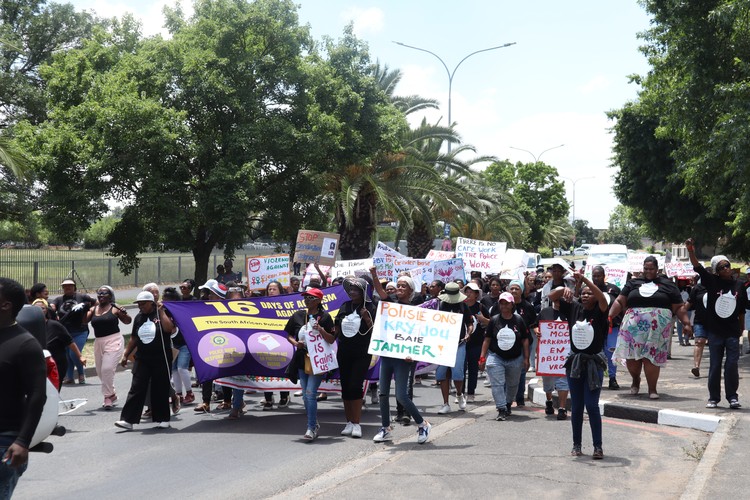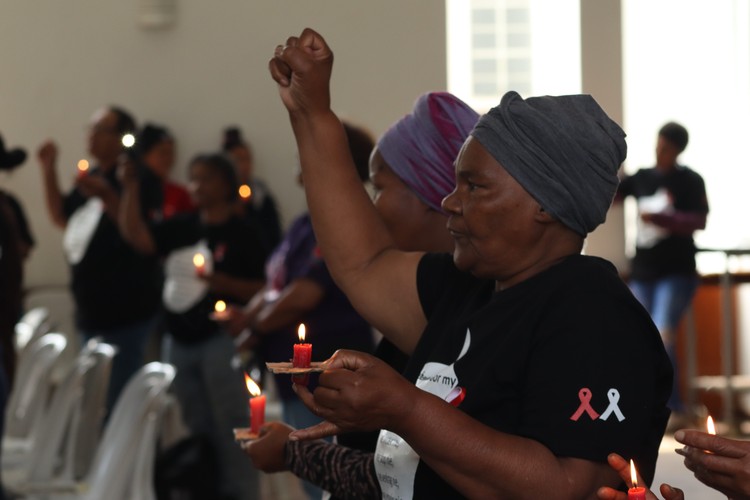Hundreds of women farm workers march to Paarl police station
Among the demands is that police in the Cape Winelands be trained on how to properly handle GBV cases
Farm women march to the police station in Paarl on Saturday to call for better handling and policing of GBV matters. Photos: Joseph Bracken
About 200 women marched to the police station in Paarl on Saturday to hand a memorandum to the Cape Winelands district commissioner. They are demanding SAPS implement ways of efficiently dealing with gender-based violence (GBV) cases.
The march, which is part of the Women on Farms Project’s annual 16 days of activism, began at the taxi rank opposite the Lady Grey Mall in Paarl.
The memorandum made several demands, including increased visibility of law enforcement in farming areas, and that all officers be trained on how to properly handle GBV cases. The document was signed by SAPS Cape Winelands cluster commander Brigadier Neville Malila on behalf of the Cape Winelands district commissioner.
“The march was successful but I don’t think [SAPS] are going to take us seriously,” said Women on Farms Project member Mateko Mohobo. She said she has seen very little change in the attitude of SAPS when dealing with GBV cases since she joined Women on Farms Project in 1996.
“It’s a struggle to get the police to come out to the farms and assist the people who call them,” said Mohobo. She said she once had to go to the station commander directly in order to get a police officer to assist in a sexual assault case involving a minor.
Before the march, the farm women held a dialogue at the Van der Stel sports club in Stellenbosch, with a few guest speakers. Several women also spoke about their grievances directly to Stellenbosch station commander Sandile Sojani.
Guest speaker Danielle Muller from the Thuthuzela Care Centre Paarl, spoke about the measures victims of GBV can take to protect themselves. Thuthuzela offers “a one-stop centre for all GBV” for medical treatment and psychological services, said Muller.
He said awareness events were important, as when people were better informed they were more likely to seek help through the proper channels. This was especially true for people on farms who often struggle to get help from police.
For many of the women on farms and in rural areas, the people perpetrating abuse were often the household’s main breadwinners. He said for people living in areas where opportunities to find alternate income were scarce, this was often a point to consider should the breadwinner be sent to prison.
Protection orders were an alternative option. However, breaking a protection order will result in the offender being arrested.
The women held up lit candles in remembrance of GBV victims during the dialogue on Saturday.
Next: More than 100 homes destroyed in Philippi weekend blaze
Previous: Constitutional Court rules 1,000 signatures required for independent candidates to contest elections
© 2023 GroundUp. This article is licensed under a Creative Commons Attribution-NoDerivatives 4.0 International License.
You may republish this article, so long as you credit the authors and GroundUp, and do not change the text. Please include a link back to the original article.
We put an invisible pixel in the article so that we can count traffic to republishers. All analytics tools are solely on our servers. We do not give our logs to any third party. Logs are deleted after two weeks. We do not use any IP address identifying information except to count regional traffic. We are solely interested in counting hits, not tracking users. If you republish, please do not delete the invisible pixel.




